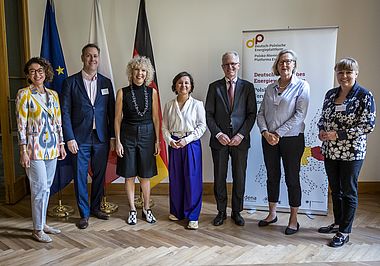Berlin, 17th May 2024. Over 120 participants from ministries, companies, industrial associations, research institutions and NGOs from Germany and Poland met today at the Federal Foreign Office in Berlin to discuss implementation options and bilateral and European cooperation on climate and energy policy. The forum was organised by the German Energy Agency (dena) and the Polish National Energy Conservation Agency (KAPE). It was conducted on behalf of the German Federal Foreign Office and held in partnership with the German-Polish Chamber of Commerce (AHK Poland) as well as the Embassy of the Republic of Poland. The first bilateral forum took place last year in April in Warsaw and is key element of the German-Polish Energy Platform. The Platform has been active since 2021.
The aim of this year's forum was to foster mutual understanding of energy policy priorities and to pool the efforts of both countries in order to provide new impulses at EU-level in the context of the European elections as well as the upcoming Polish EU Council Presidency in 2025. Focus of the event were the implementation of a socially responsible heating transition and the decarbonisation of industry as a driver of growth. Germany and Poland are facing similar challenges in the energy transition. The panellists discussed the status of the heating transition in both countries and the impact of different national funding instruments. Participants also addressed how the decarbonisation of the industry contributes to job creation and increases energy security with the help of new technologies and business models.
According to Jennifer Morgan, State Secretary and Special Envoy for International Climate Action: „Only together, we can solve the climate crisis; only together, we can advance the green transition. When we, as Europeans, join our forces and invest in the decarbonization of our industries, we ensure that Europe remains competitive and that we take active part in designing the green markets of the future. In Germany as in Poland, we are pushing for a just energy transition that combines the necessary transformation with new opportunities, and leaves no one behind. An energy transition that creates jobs, ensures quality of life and boosts prosperity.”
Urszula Zielińska, State Secretary at the Ministry of Climate and Environment of the Republic of Poland emphasised the challenges and opportunities of an ambitious energy transition: "In Poland, at least since the October 15, 2023 elections, the course for transformation is clear and in line with the direction of the European Union as a whole. Achieving the targets enshrined in the EU climate law: - 55% of CO2 emissions by 2030 and climate neutrality by 2050 are also our goals. This direction is to improve energy efficiency in the economy and in our homes. It's an energy mix based on domestic onshore and offshore wind resources. It's solar power, biogas and biomethane, nuclear power and it's green hydrogen, for which we are preparing a new regulatory framework later this year. It's the transformation of district heating to low-temperature grids, large-scale heat pumps and heat storage powered by RES and green renewable gas, and modern through digital management."
Kristina Haverkamp, Managing Director of the German Energy Agency (dena), emphasises the importance of close cooperation between Germany and Poland for the energy transition and says: "Through the constructive exchange at this forum, we can jointly develop solutions that not only advance our countries, but Europe as a whole. Specifically, the German-Polish Energy Platform is already supporting the cities of Görlitz and Zgorzelec in connecting their district heating networks in order to supply the region with climate-neutral district heating."
Karolina Loth-Babut, Managing Director of the Polish National Energy Conservation Agency (KAPE) emphasized the importance of the common challenges Poland and Germany face in the era of increasingly severe climate change: "Shared climate challenges, including energy transition, are a great opportunity to build a bridge between nations to jointly turn challenges into opportunities. The Forum is a great opportunity to bring together the different sides of the energy transition process in order to jointly achieve a synergy of action for a better future".
Extended framework programme and new partnerships
For the first time, the German-Polish Energy Transition Forum was part of a framework programme. The evening before the forum, representatives of German and Polish think-tanks as well as NGOs exchanged views on energy and climate policy cooperation at civil society level at a side event organised in cooperation with Germanwatch in the German Bundestag. Later in the evening, participants were invited to a reception at the Polish Embassy.
The forum and its framework programme offered the opportunity for a solution-oriented exchange and was received with great interest.
About the German-Polish Energy Platform
The German-Polish Energy Platform is organised by the German Energy Agency (dena) in cooperation with the Polish National Conservation Agency (KAPE). The aim of the German-Polish Energy Platform is to identify common challenges and opportunities in the energy transition, to exchange best practices and experiences and to support the implementation of cross-border projects.
Further information can be found at www.d-p-plattform.de.

